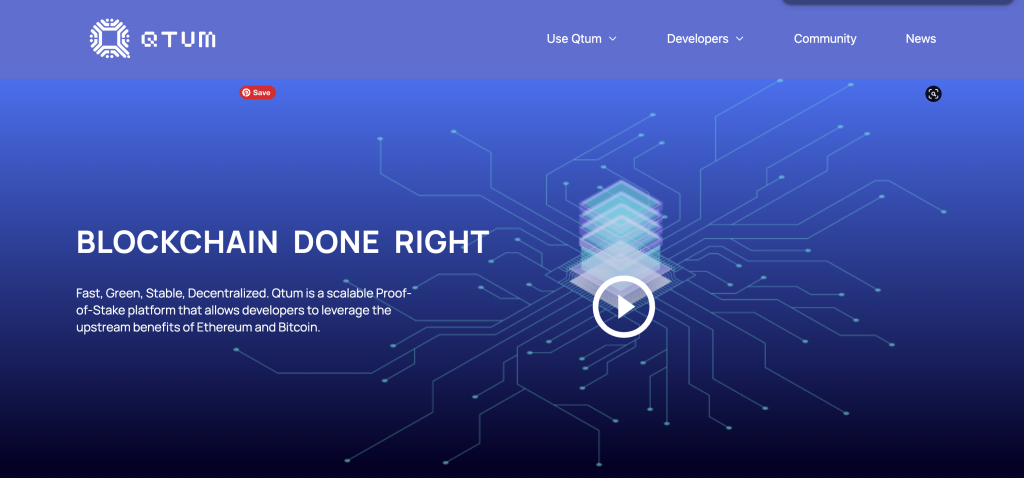As blockchain technology continues to evolve, new platforms are emerging that aim to solve the challenges posed by their predecessors. One such platform that’s causing a stir in the blockchain community is QTUM. This comprehensive review deeply delves into QTUM’s vision, unique technology, journey, and future potential.
What is QTUM?
Launched in 2017, QTUM is a Singapore-based open-sourced blockchain platform combining Bitcoin and Ethereum’s strengths. QTUM aims to establish a smart contract platform that is secure, flexible, and scalable, using Bitcoin’s secure transaction model with Ethereum’s smart contract functionality. It seeks to facilitate businesses and institutions with a robust and versatile blockchain infrastructure.
Uniqueness of QTUM
QTUM’s unique proposition lies in its fusion of Bitcoin’s UTXO (Unspent Transaction Output) model with Ethereum’s EVM (Ethereum Virtual Machine). The UTXO model, adopted from Bitcoin, allows for higher security and privacy. Simultaneously, Ethereum’s EVM enables the development and execution of complex smart contracts, thus bringing programmability to the QTUM blockchain.
QTUM also utilizes a Proof-of-Stake (PoS) consensus mechanism, which enhances scalability and efficiency while reducing the energy consumption often associated with Proof-of-Work algorithms used by Bitcoin and Ethereum.
Moreover, QTUM’s Decentralized Governance Protocol (DGP) allows for blockchain parameter modifications (like block size) without necessitating hard forks. This makes the platform more adaptable and resilient to evolving business and technological needs.

QTUM Token and Its Use Cases
The native cryptocurrency of the QTUM ecosystem is the QTUM coin. It serves multiple purposes within the platform. Users employ QTUM coins to participate in the network’s governance, vote on various protocol proposals, and execute smart contracts. QTUM coin also serves as a reward for validators who secure the network through staking.
History of QTUM
QTUM was founded by Patrick Dai, Neil Mahi, and Jordan Earls. The team aimed to create a bridge between Bitcoin’s robust transaction model and Ethereum’s smart contract capabilities, thus aiming to offer the best of both worlds.
In March 2017, QTUM held a successful initial coin offering (ICO), raising approximately $15 million in less than five days. Since its launch, QTUM has cultivated partnerships with several notable companies and organizations, demonstrating the platform’s viability and potential.
Future Roadmap
QTUM’s future roadmap includes several ambitious plans. The team aims to continue improving the platform’s scalability and security. This includes ongoing work on the QTUM Neutron upgrade, a new virtual machine infrastructure designed to allow developers to write smart contracts in multiple programming languages, thus broadening the platform’s appeal to developers.
Additionally, QTUM has plans to implement privacy features using Mimblewimble technology, further enhancing the robustness and appeal of the platform.
Assessing QTUM’s Future Potential
QTUM’s unique blend of Bitcoin and Ethereum’s strengths holds considerable promise. It positions the platform as a compelling choice for businesses and developers seeking a secure, flexible, and scalable blockchain infrastructure.
However, QTUM faces competition from other smart contract platforms and the ongoing development efforts from Bitcoin and Ethereum. Regulatory uncertainties surrounding the crypto and blockchain space could also pose potential hurdles.
Despite these challenges, QTUM’s unique technology stack, its track record of stable development, and its ambitious future plans indicate strong future potential. The platform’s focus on combining security with programmability and scalability makes it a compelling project in the rapidly evolving blockchain landscape.
In conclusion, QTUM stands as an innovative solution in the blockchain world. Its vision and ongoing efforts to bring the strengths of both Bitcoin and Ethereum to businesses and developers make it a project to watch in the ongoing blockchain revolution.